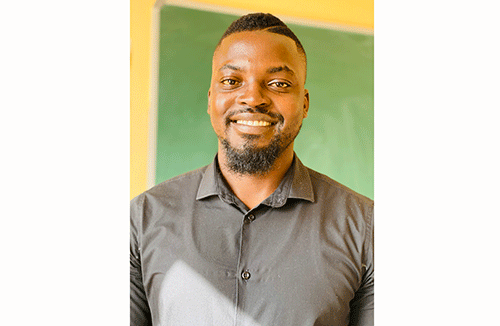They say that we are all products of our environment and this assertion rings true for Daniel Ndapewa Kalipi, who joined the public service because most of his peers and almost everyone in his family was a civil servant.
Therefore, working for the government became his immediate goal.
“Growing up, I was only surrounded by civil servants. And I am talking about my parents, uncles, and aunts. We saw them paying bills and putting food on their tables. We knew that it was because they work for the government. Naturally, we grew up to emulate that,” he said.
Kalipi (28) is a senior education officer in the Directorate of National Examinations and Assessment (DNEA) within the Ministry of Education, Arts and Culture. He is part of the team responsible for conducting national examinations and publishing the results.
His major responsibility is to oversee the development of the national examinations for Senior Secondary Certificate Ordinary Level grade 11 and Namibia Senior Secondary Certificate Advanced Subsidiary grade 12 focusing on Geography and Entrepreneurship.
He is also responsible for developing the specification grids, question papers, and mark schemes.
Besides that, Kalipi is also responsible for appointing and training the national markers and their standardisation in the marking process, overseeing the compilation of examiner reports, and conducting workshops on examiner reports that are intended to improve teaching and learning for better national results.
He is an ex-officio member of the Social Sciences and Commerce Curriculum Panel, which is responsible for reviewing Namibian curricula and improving them based on the needs of society.
His journey
Kalipi completed high school at Etosha Secondary School in Tsumeb and studied education, Biology, and Geography at the University of Namibia (Unam) from 2013 to 2016.
His career in public service started in the year 2016, at Oshuungu Combined School as a relief teacher in the Omusati region.
Upon completing his studies in 2018, he started working as a teacher at Angra Pequena Senior Secondary School in Lüderitz.
“After completing tertiary education, like anybody else, my dream was to get a job in the area of my expertise. Of course, teaching jobs were also available in the private sector. However, the government had a huge market for newly graduated teachers and the reward was attractive in comparison to the private sector,” said Kalipi when asked why he joined the government.
While he has always been a fan of public service, he never knew that he would end up spending the biggest part of his life as a dedicated civil servant.
Kalipi believes that what attracted him to public service was the fact that there were more job opportunities compared to the private sector.
He also believes that as a senior education officer, he has a huge influence on the Namibian child in terms of the national results of Geography and Entrepreneurship and his expertise will always be an advantage to the Namibian child.
“I have a very large positive impact on the Namibian Education System,” he said.
Kalipi said what he found rewarding about his job is improved quality education and results, through quality question papers, set at the Namibian standards, and marked at the most competent level, where every learner’s ability is awarded.
“Having a sense of belonging, purpose to wake up, and being a positive contributing factor to the Namibian economy and future through providing quality education,” he said.
When asked to highlight some of his notable achievements and accomplishments as a civil servant, Kalipi had this to say: “I was a national facilitator for the implementation of the new NSSCAS Geography Curriculum. Getting promoted from being a teacher to a senior education officer at DNEA at the age of 27, where my abilities can be better utilised.” When asked his views on the misconception that the public service is ineffective and lazy, Kalipi said, “completing your work makes you productive, but if the work completed is of poor quality and there’s no accountability, this makes one inefficient.
So work does get completed but not at the expected standard or desired standard, but those are the expertise we have. People are working hard and to label the whole entire workforce unproductive and inefficient, is biased.”
Only the future, he said, holds the answer to the question of how long he will remain in the civil service, but he remains open to any possibility that guarantees growth. Personally, he just wants to live his life according to his own philosophy of life and have fun “since we are all going to die”.


